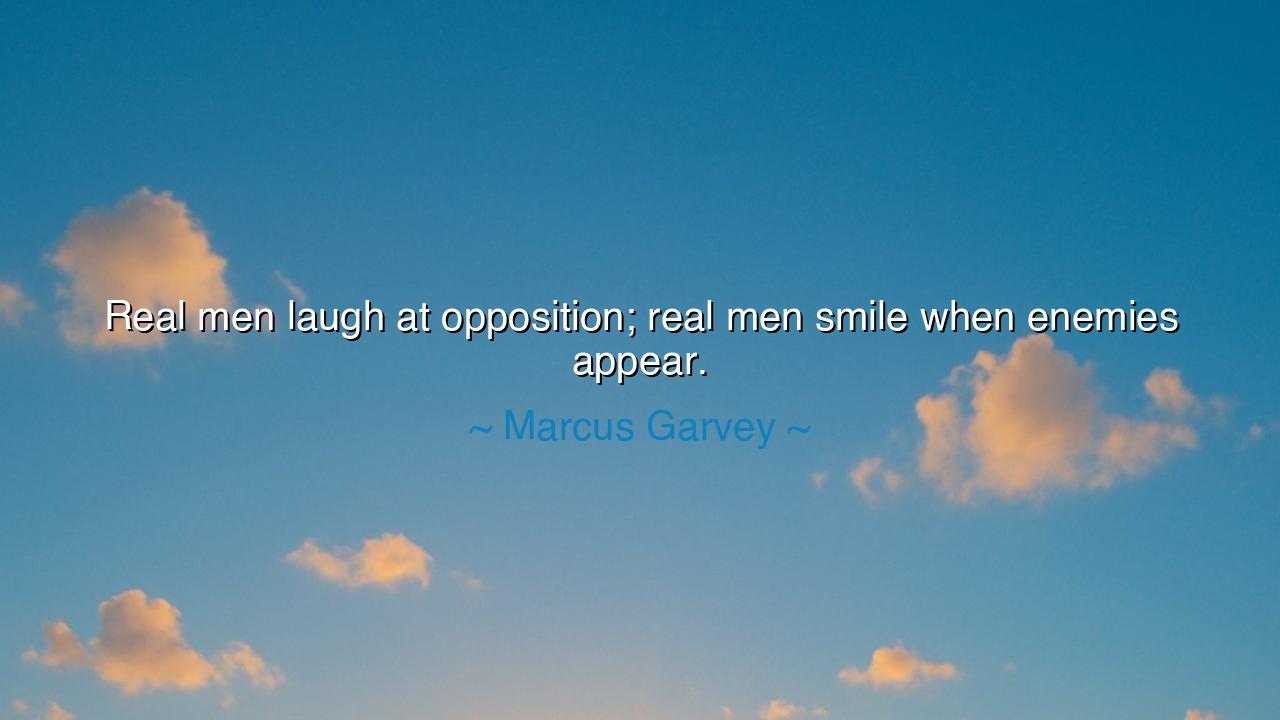
Real men laugh at opposition; real men smile when enemies appear.






Hear the thundering words of Marcus Garvey, prophet of Black pride and herald of self-determination: “Real men laugh at opposition; real men smile when enemies appear.” These words are not the boast of arrogance, but the anthem of resilience. For Garvey, who lived in an age when his people were bound by chains both visible and invisible, strength was not measured by wealth or titles, but by the unshakable courage to face hatred without fear, and to meet adversity not with despair, but with defiance.
To laugh at opposition is not to mock lightly, but to declare that the obstacles placed before you are too small to break your spirit. It is the laughter of the warrior who knows the battle may be long, yet his cause is greater than his suffering. And to smile at enemies is not to welcome their malice, but to show them they cannot wound your soul. The smile becomes a shield, a signal that their power ends where your spirit begins. This is the essence of Garvey’s teaching: that true strength lies not in brute force, but in the mastery of self, in the refusal to be shaken.
Garvey himself lived these words. Born in Jamaica in 1887, he rose from humble beginnings to found the Universal Negro Improvement Association, inspiring millions across the African diaspora to reclaim dignity, pride, and unity. He faced relentless opposition—from colonial authorities, from governments, from those who feared his vision of Black empowerment. He was spied upon, arrested, ridiculed. Yet he pressed onward, carrying himself with the poise of a leader who would not bend. In the face of enemies, he smiled, because he knew his cause—freedom and pride for his people—was larger than any single man who opposed him.
History provides other examples of this same spirit. Think of Nelson Mandela, who spent 27 years imprisoned under the harsh rule of apartheid. He emerged not bitter, but smiling, declaring reconciliation instead of revenge. The oppressors expected him broken; instead, he laughed at their attempt to crush him and turned their punishment into his platform. Like Garvey, Mandela understood that enemies lose power when the oppressed refuse to bow before them.
The lesson is not confined to great leaders. It belongs to all who struggle. When life places barriers before you—poverty, prejudice, betrayal—you can be consumed by anger, or you can stand tall and refuse to let it claim your soul. When detractors mock you, do not give them the victory of your despair. When enemies rise against you, smile—not because you are blind to their threat, but because you know your inner fire burns brighter than their darkness. This is the secret of the real man, and indeed the real human being: to master the self so fully that the storms of the world cannot shake your calm.
Yet Garvey’s words also demand action. To laugh at opposition is not to ignore it, but to press forward in spite of it. To smile at enemies is not to submit, but to deny them control over your heart. It is a call to courage, to steadfastness, to endurance. It tells us that true greatness lies in unbreakable composure, in the refusal to allow hate, fear, or resistance to dictate the course of your destiny.
Therefore, O seekers of strength, take Garvey’s wisdom to heart: do not tremble when enemies appear, nor falter when obstacles rise. Let your laughter be a sign of your confidence, your smile a signal of your unyielding spirit. For the world will always place trials before those who seek to change it, but the real man—the real warrior of truth—walks forward undaunted. This is how nations are freed, how movements endure, and how souls remain unconquered.






AAdministratorAdministrator
Welcome, honored guests. Please leave a comment, we will respond soon